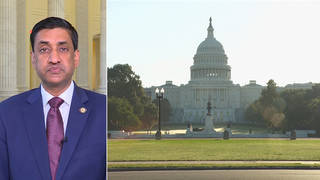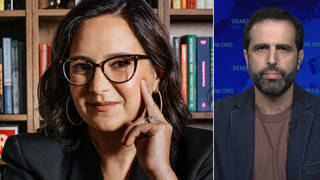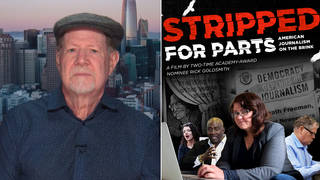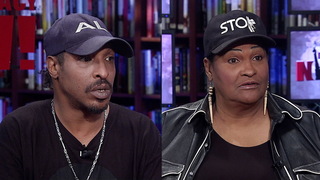
Topics
Guests
- Ishmael Reededucator, writer and activist. He is author of the book, The Complete Muhammad Ali, which was published last year. Reed is a 1998 recipient of the MacArthur “genius” award and is currently a visiting scholar at the California College of the Arts.
Music legend John Legend reads Muhammad Ali’s speech against the Vietnam War in 1966. “Why should they ask me to put on a uniform and go 10,000 miles from home and drop bombs and bullets on brown people in Vietnam, while so-called Negro people in Louisville are treated like dogs and denied simple human rights?” Ali said. John Legend’s reading appears in the film “The People Speak,” which is based on Howard Zinn and Anthony Arnove’s “Voices of a People’s History of the United States.”
Transcript
AMY GOODMAN: Well, I want to turn to the famed singer-songwriter John Legend reading the words of Muhammad Ali’s 1966 speech on Vietnam.
JOHN LEGEND: [reading Muhammad Ali] “Why should they ask me to put on a uniform and go 10,000 miles from home and drop bombs and bullets on brown people in Vietnam, while so-called Negro people in Louisville are treated like dogs and denied simple human rights? No, I am not going 10,000 miles from home to help murder and burn another poor nation simply to continue the domination of white slave masters of the darker people the world over. This is the day when such evils must come to an end. I have been warned that to take such a stand would put my prestige in jeopardy and could cause me to lose millions of dollars which should accrue to me as the champion.
But I have said it once, and I will say it again: The real enemy of my people is right here. I will not disgrace my religion, my people or myself by becoming a tool to enslave those who are fighting for their own justice, freedom and equality. If I thought the war was going to bring freedom and equality to 22 million of my people, they wouldn’t have to draft me, I’d join tomorrow. But I either have to obey the laws of the land or the laws of Allah. I have nothing to lose by standing up for my beliefs. So I’ll go to jail. We’ve been in jail for 400 years.”
AMY GOODMAN: That was John Legend, yes, the singer-songwriter, in a clip from The People Speak, which was inspired by the late great historian Howard Zinn’s groundbreaking books, A People’s History of the United States and Voices of a People’s History of the United States. That speech was Muhammad Ali’s speech. Ishmael Reed, talk about what happened to him, being—announcing that he would not go to war, being sentenced to five years in prison, being stripped of his heavyweight title, the case going right to the U.S. Supreme Court, before it was overturned, before it was reversed.
ISHMAEL REED: Well, Ron Lyle, who fought Muhammad Ali, said that the three years that were taken out of his career missed a—did not provide an opportunity for us to see him at his prime. And after that three-year absence from the ring, he lost his speed, slowed down. Before, you couldn’t hit the guy. I mean, he said he was pretty because people couldn’t touch him. But after he lost his speed, people could hit him, and you could touch him, and that continued to the end of his career. Now, I interviewed the great trainer, Emanuel Steward, who said that—who incidentally said that he thought that Joe Louis was the greatest heavyweight champion of all time. But he said that Ali should have quit after he fought George Foreman. And even in that fight, he took a lot of punishment to the body. So, I think the three years deprived him of, you know, our seeing him at his prime.
AMY GOODMAN: George Foreman was the Rumble in the Jungle?
ISHMAEL REED: Mm-hmm.
AMY GOODMAN: In what was then Zaire, now the Democratic Republic of Congo. Mobutu Sese Seko set up this whole battle, one that the dictator didn’t even go actually to see, perhaps afraid he would be assassinated if he came out in public?
ISHMAEL REED: Well, he thought—they thought that the people would elect Muhammad Ali leader, you know, the president of the Congo. That’s why Mobutu was afraid. But, you know, Muhammad Ali did sort of play footsies with dictators like Mobutu, Marcos. I interviewed the great journalist Emil Guillermo, who used to work for NPR. I met him, a Harvard graduate. He said that the fight in Manila brought the Philippines into the 20th century. They were no longer dismissed as “our little brown cousins,” but became a first-class nation because of that fight and the publicity that came as a result of that fight. Now, the Aquino family was in San Francisco and other places. They objected to that fight, because they thought it would bring prestige to Marcos. But at the same time where he’s palling around with Marcos, he went out and met with the rebels during Ramadan. So, that shows you how complex Ali was.
AMY GOODMAN: We’re going to break, and when we come back, we’ll also be joined by Elizabeth Alexander. Ishmael Reed is an educator, writer, activist. His latest book, The Complete Muhammad Ali. Reed the recipient of the MacArthur “genius” award, currently visiting scholar at the California College of Arts. We’re going to hear Elizabeth Alexander recite her poem, “Narrative: Ali.” Stay with us.












Media Options